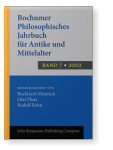Husserlian Transcendental and Eidetic Reductions and the Interpretation of Plato’s Dialogues
This essay articulates obstacles to an interpretation of the whole proper to Plato’s philosophy that are rooted in the general methodical principle of traditional hermeneutics, and then addresses them by a novel hermeneutic application of Husserl’s transcendental and eidetic reductions. This application involves disclosing the transcendental phenomena of the texts of Plato’s dialogues on the basis of the former and articulating their phenomenological essence in accord with the latter. A meta-hermeneutical argument for what Plato himself might have thought is then ventured, which takes as its point of departure both the transcendental phenomena of his texts and Aristotle’s report that eide for him were in some sense arithmoi.
